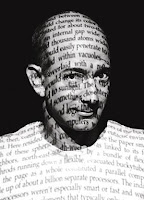Was Scott Turow clairvoyant when he chose to name the fictional setting of his multiple overlapping novels Kindle County? That was my first facetious thought when reading about Amazon.com founder Jeff Bezos' new toy the Kindle, or as Newsweek breathlessly christened it, "The Future of Reading."
That was my first facetious thought when reading about Amazon.com founder Jeff Bezos' new toy the Kindle, or as Newsweek breathlessly christened it, "The Future of Reading."
That's the thing about the technology game. Every hotshot techno-guru out there is convinced he's just about to trip over the killer app that's going to change everything -- and not incidentally, make him rich (or in Bezos's case, rich AGAIN). The problem in this particular case is that the killer app in question was already invented... in the 15th century.
It's called a book.
Yes, the Kindle device is designed to approximate the size and weight of a book, as if that little detail is going to close the deal for all of us print-addicted Luddites. And yes, it's pretty nifty that they developed screen technology for the Kindle that comes closer to imitating the visual texture of the printed page than anything ever seen before. And sure, it's pretty mind-boggling to realize that this device, linked wirelessly to Amazon's entire database of Kindle-d editions of books, could someday put every book ever written at your fingertips in searchable electronic form, even allowing authors to amend and update their manuscripts, adding new facts to non-fiction books or changing the endings of novels. The Kindle has one insurmountable flaw, though. It's not a book.
The Kindle has one insurmountable flaw, though. It's not a book.
Books are physical objects. Each has a distinctive appearance, texture, smell and heft in your hand. Each is unique, and permanent, and if it's really good, maybe even a permanent part of your home and your life. Almost every day working in my study I look up at my bookshelf and let my eyes wander across the spines of books I've read. Would it be fun to be able to search instantly for every time Robert Crais references a specific real-life location in Los Angeles in his Elvis Cole/Joe Pike novels? Sure. But I wouldn't give up my hardcover copy of The Watchman to be able to do it. And if he went back and changed the ending of the book, I would be outraged. I would feel cheated, and that the bond of trust between author and audience had been broken. Stories are stories, and their human imperfections are part of their essence.
Life within a display screen is not life, it's an electronic illusion of it. The Kindle is no more "the future of reading" than androids are the future of the human race. It's a soulless little machine, not to mention, what happens if you drop it while you're reading in the bathtub?
Thursday, November 29, 2007
Kindle counting
Posted by
Jason Warburg
at
5:59 PM
![]()
Labels: culture, Robert Crais, Scott Turow, writing
Subscribe to:
Post Comments (Atom)

1 comment:
Ya, I have to say I'm not big on this thing either. I think that no mater what magic they work with a screen, they're never going to replace the feeling of a book that you've read many times or the smell of a 50 year old book. I know that I love having my few books that I've worn the pages out of. There are some intangibles that can't be captured with electronics. Plus, for $400 it's not as cool as an iPhone. I'd like to know how many books you would have to buy to start saving money at $9.99 per book.
Post a Comment